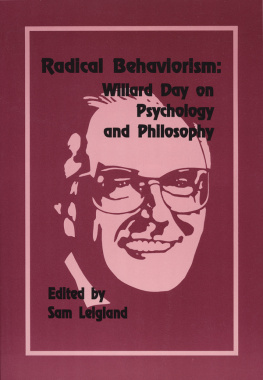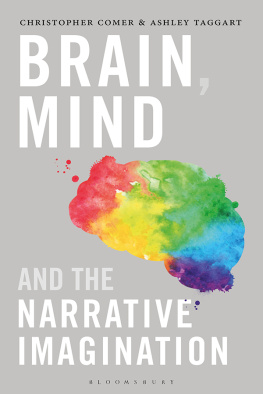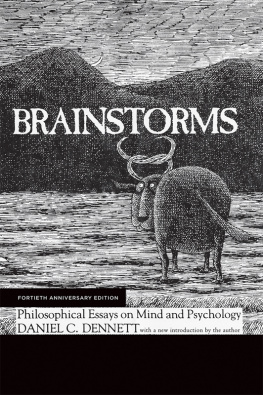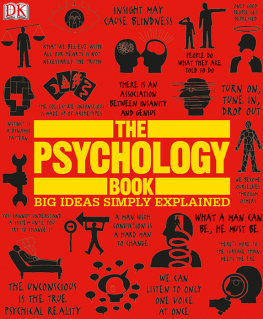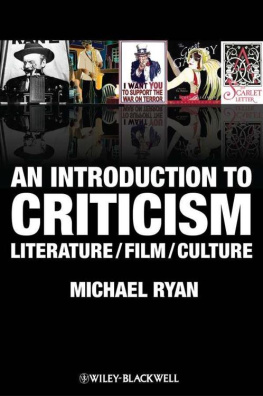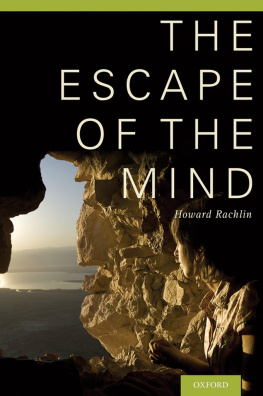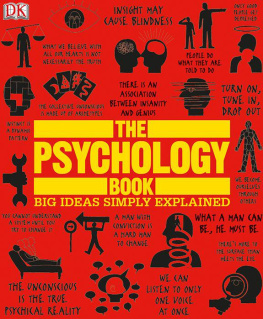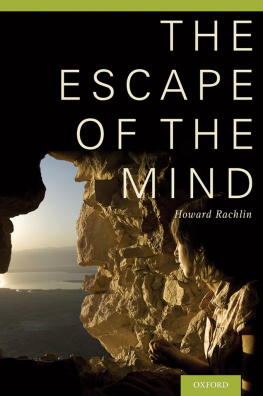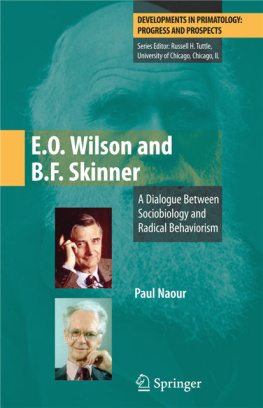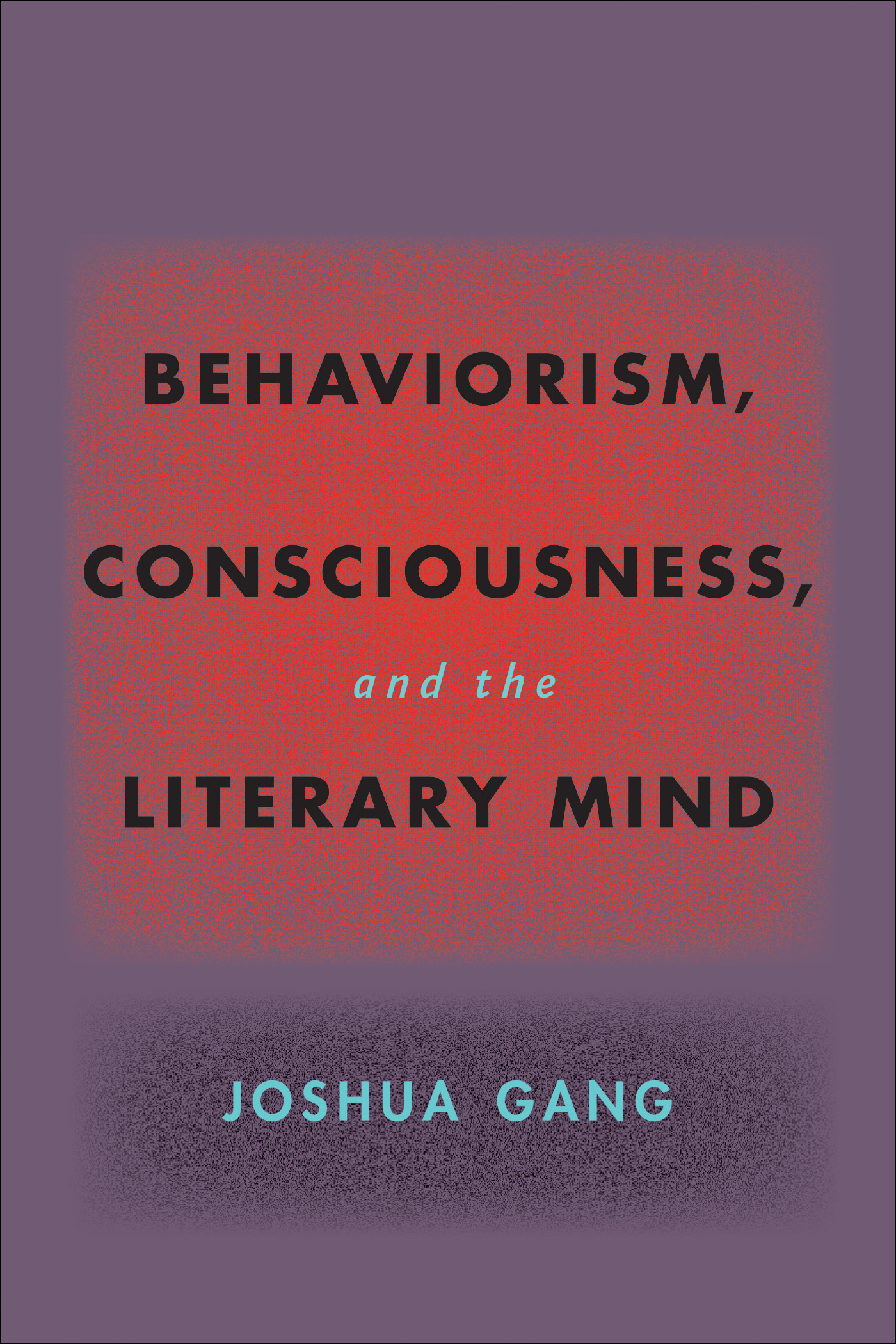Contents
Guide
Behaviorism, Consciousness, and the Literary Mind

Hopkins Studies in Modernism
Douglas Mao, Series Editor
Behaviorism, Consciousness, and the Literary Mind
Joshua Gang

Johns Hopkins University Press
Baltimore
This book was brought to publication through the generous assistance of the David L. Kalstone Memorial Fund, administered by the Department of English at Rutgers University.
2021 Johns Hopkins University Press
All rights reserved. Published 2021
Printed in the United States of America on acid-free paper
9 8 7 6 5 4 3 2 1
Johns Hopkins University Press
2715 North Charles Street
Baltimore, Maryland 21218-4363
www.press.jhu.edu
Library of Congress Cataloging-in-Publication Data
Names: Gang, Joshua, 1981 author.
Title: Behaviorism, consciousness, and the literary mind / Joshua Gang.
Description: Baltimore : Johns Hopkins University Press, 2021. | Series: Hopkins studies in Modernism | Includes bibliographical references and index.
Identifiers: LCCN 2021003099 | ISBN 9781421440842 (hardcover) | ISBN 9781421440859 (paperback) | ISBN 9781421440866 (ebook)
Subjects: LCSH: Behaviorism (Psychology) | Literature, Modern20th centuryHistory and criticism. | Psychology and literature. | Modernism (Literature) | LCGFT: Literary criticism.
Classification: LCC PN56.B39 G36 2021 | DDC 809/.933530904dc23
LC record available at https://lccn.loc.gov/2021003099
A catalog record for this book is available from the British Library.
Excerpts from Gilbert Ryles The Concept of Mind are reproduced with the permission of the Principal, Fellows and Scholars of Hertford College, University of Oxford.
Excerpts from Samuel Becketts Psychology notebook typescript are reproduced with the permission of the Estate of Samuel Beckett, Rosica Colin Ltd., and the Librarians of Trinity College, Dublin.
Special discounts are available for bulk purchases of this book. For more information, please contact Special Sales at .
In honor of JHEJ
And for EAJJKAE
Acknowledgments
Sometime in 2007 I started puzzling over the relation between mental states and linguistic representations of mental states. Four English departments, three time zones, and two countries later, those thoughts have become this book. My debts are therefore significant and widespread.
First, I want to thank my dissertation committee, as well as the Rutgers English department as a whole. I owe my dissertation director, Rebecca Walkowitz, far more than I can express either elegantly or concisely. Without her wisdom and kindness, I very much doubt my puzzling about mind and language would have been worth reading. I am also indebted to the other internal committee members, Jonathan Kramnick and Elin Diamond. Conversations about literature and philosophy with Jonathan and about aesthetics and performance with Elin are among this books most important foundations. Additionally, I would like to thank Doug Mao, who, as my external reader in 2012, gave me nothing less than transformative feedbackand who, as a series editor, saw potential in my book manuscript in 2019. Thank you, Doug, for your guidance and for the critical conversations that your own work has made possible. Beyond my dissertation committee, my work benefited enormously from many faculty at Rutgers English and the Center for Cultural Analysis: Emily Bartels, Lynn Festa, Billy Galperin, Colin Jager, David Kurnick, Meredith McGill, Michael McKeon, Jonah Siegel, Henry Turner, and Carolyn Williams. My gratitude to the David L. Kalstone Memorial Fund at Rutgers English for subvention support. I also need to thank those friends I made at Rutgers English: Sarah Alexander, Jordan Aubry, Sean Barry, Manuel Betancourt, Mike Gavin, Octavio Gonzalez, Devin Griffiths, Alan Herring, Craig Iturbe, Devon McConaghy, Sarah Morgan, Elizabeth Oldfather, Brian Pietras, Emma Raub, Colleen Rosenfeld, John Savarese, Samantha Stern-Leaphart, Mark Vareschi, Meryl Winick, and Mary-Rush Yelvertonwith extra gratitude to Sarah Balkin, Daniel Crossen, Gregory Ellermann, Naomi Levine, Katherine Williams, and Emily Zubernis. And even though I left New Jersey years ago, Cheryl Robinson will always be my boss. Like most graduates of Rutgers English, I owe Cheryl and Courtney Borack so very much.
In the fall of 2012 I began a postdoctoral fellowship at Washington UniversitySaint Louis. It was there that I had the good fortune to become the employee, student, and friend of Vincent Sherry, whose faith in this book has meant the world. My thanks as well to Brendan Beirne, Dillon Brown, Jennifer Kronovet, Edward McPherson, Steven Meyer, Jessica Rosenfeld, and Rafia Zafar. Additionally, the Mellon Neuroscience and Humanities Seminar was an indispensable experience for me right when I needed it most. In 2013 I began a job at the University of Toronto, where new colleagues and friends helped me realize my projects aims. In particular, I would like to thank Liza Blake, Denise Cruz, Thom Dancer, Greig Henderson, Alexander Hernandez, Mark Knight, Deidre Lynch, Jeremy Lopez, Terry Robinson, Matthew Sergi, Simon Stern, David Taylor, and Morgan Vanek, as well as department chairs Alan Bewell and Paul Stevens. An extra note of thanks to Kara Gaston and Danny Wright. Conversations with Danny opened this project up in ways I never anticipated and made me a better critic. And every part of this book has benefited from Karas brilliance and humor.
In fall 2015 I moved to Berkeley, where, in many ways, Behaviorism, Consciousness, and the Literary Mind became the book it is now. I am indebted to all my colleagues in Berkeleys English department for their investment in my research. Dan Blanton, Eric Falci, Catherine Flynn, Mark Goble, Donna Jones, and Steven Justice all read the manuscript in its entirety and offered incredibly helpful feedback. During the final year of manuscript revisions, most of which happened during the COVID-19 lockdown, Dan, Eric, and Catherine continued to read new revisions and helped me toward the finish line. I never would have reached it without them. A final word of gratitude must go to Eric, who has been an extraordinary mentor. My sincerest thanks to my department chairs Steven Justice, Genaro Padilla, and Katherine OBrien OKeeffe and department administrators Linda Fitzgerald and Joemari Cedro for their support. Charlie Altieri, Amanda Jo Goldstein, Dorothy Hale, Victoria Kahn, Grace Lavery, Colleen Lye, David Marno, Kent Puckett, Poulomi Saha, and Dora Zhang read portions of my manuscript and helped me think through some of its most difficult problems. Additionally, I would like to thank Elizabeth Abel, Oliver Arnold, Mitchell Breitwieser, Cecil Giscombe, Marcial Gonzalez, Kevis Goodman, Kristin Hanson, Lyn Hejinian, Jeffrey Knapp, David Landreth, Steven Lee, Fiona McFarlane, Sue Schweik, Namwali Serpell, Katherine Snyder, and Elisa Tamarkin for their advice and encouragement. I am indebted to all my students at Berkeleyespecially those in my graduate seminars in the fall of 2016, spring of 2019, and fall of 2020. My thanks to Dylan Furcall and Emily Sutton in particular, as well as my research assistant Ari Oppenheimer. I am grateful for the fellowships and research support I received from the Townsend Humanities Center (under the direction of Timothy Hampton), the Division of Arts and Humanities, and the Office of the Vice Provost for Faculty. I would also like to offer special thanks to several colleagues, both inside and outside the English department, whose friendship and intellectual generosity have meant so much: Danika Cooper, Shamik Dasgupta, Chiyuma Elliott, Julia Fawcett, Andrew Leong, Duncan MacRae, Kristin Primus, and Emily Zazulia.


